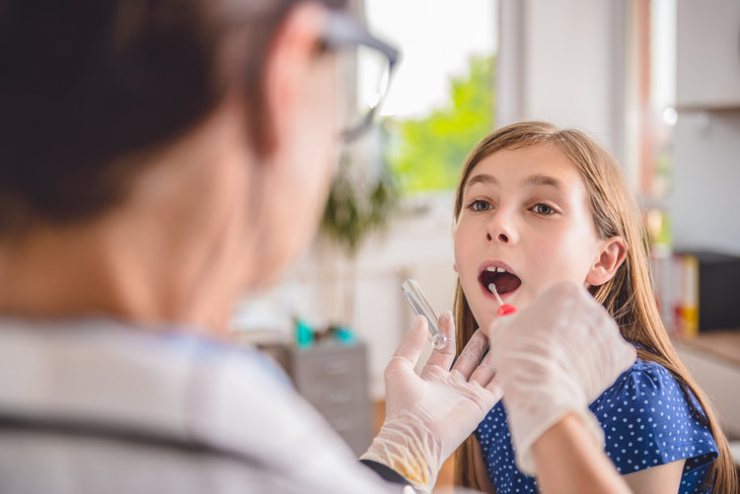
Closely-held Lineagen has developed and commercialized a comprehensive portfolio of behavioral screening and genetic tests for autism spectrum disorders (ASD) and other forms of childhood neurodevelopmental disorders (NDDs).
“We are the only commercial diagnostic provider dedicated solely to the genetics of childhood developmental disorders,” Michael Paul, president and CEO, says in an interview with BioTuesdays. “We work with leading academic institutions and advocacy groups, but childhood developmental disorders is all we do.”
In the past, physicians would often advise parents to “wait and see” because they simply didn’t have accurate and accessible tools to diagnose the underlying genetic cause for a child’s developmental delay. “Genetic testing today means treating correctly sooner,” Dr. Paul contends.
Lineagen’s portfolio of genetic testing includes FirstStepDx Plus, a proprietary chromosomal microarray to detect larger deletions and duplications in the genome, which Dr. Paul says is like finding an entire page that has been torn out of, or inserted into, a book.
“And when we can’t find something with FirstStep, we move to NextStepDx Plus,” he adds. “This is a next-generation sequencing test to look at a higher resolution of the genome and detect smaller genome changes not detected by a chromosomal microarray.” He likens this process to finding a single letter missing in a sentence.
Lineagen has also developed advanced testing for a range of other conditions. Some prominent examples include the genetic mutation responsible for fragile X syndrome, which causes a range of learning disabilities and cognitive impairment; pharmacogenetics testing of genes that can impact dosage and choice of drug types, including anti-seizure agents; and mitochondrial DNA testing for variants associated with neurodegenerative diseases.
“So from a single cheek swab collected by a physician or pediatric specialist, we can look at a child’s genome in multiple ways,” he points out. “This provides a clearer picture than ever before for individuals and families dealing with neurodevelopment disorders, while providing Lineagen with multiple revenue opportunities.”
In 2017, the company generated approximately $18-million in revenue, reflecting a more than 70%-plus compound annual growth rate in revenue from billable tests and other services between 2014 and 2017.
The company serves a market of some 7,700 developmental pediatricians, pediatric neurologists, geneticists, and certain non-specialists like general pediatricians in the U.S., who typically order four-to-five tests a month from Lineagen at about $2,000 a test, resulting in an estimated U.S. addressable market of $850-million annually. Primary sales are to pediatric specialists, who currently represent about 70% of orders and 82% of volume.
“Besides testing, we provide personalized, easy-to-understand test results, genetic counseling and clinical education, and end-to-end reimbursement support,” Dr. Paul says. Third-party insurers currently cover and reimburse FirstStep, fragile X and NextStep.
According to Dr. Paul, the prevalence of ASD has soared 600% during the past 20 years. Currently, the global prevalence of ASD is one-in-47 boys and one-in-68 for all children.

Explaining the increase, he cites better testing methodologies, genetic mutations that occur during development and potential environmental causes, such as pollution. The age of the father at conception also has been linked as a risk factor for autism because sperm DNA is known to mutate with aging and these mutations can be passed to the child.
“Genetic testing is recommended as a first-line diagnostic for autism because an early diagnosis can change the course of clinical management,” Dr. Paul contends. “And estimates from academic institutions suggest that autism is 70% to 80% genetic in origin.”
And while there is an approximate 2% risk of a first child having autism, the risk jumps to 25% with a second child, if a first child in a family has been diagnosed with autism.
In many U.S. states, children from birth to 3 years of age can automatically qualify for early intervention services if they have a documented genetic cause of their ASD/NDD, he adds.
Dr. Paul says all of Lineagen’s patients receive a clinically meaningful result. Some 86% of tested patients receive either a pathogenic genetic finding for ASD/NDD; a genetic carrier status; or a variant of unknown significance, which Lineagen attempts to interpret with its higher genetic resolution PRISM interpretation program licensed from Toronto’s SickKids Hospital. In about 14% of patients, the company’s technology can rule out hundreds of genetic conditions so doctors and parents can focus on next steps.
“There is a behavioral treatment for autism spectrum disorders that has been clinicallu proven to be effective in children as young as 18 months of age, and that has been shown to sustain IQ gains of 20-to-30 points,” Dr. Paul says. “This can be the difference between independent and dependent living as an individual grows to adulthood.”
In January, Lineagen inked a partnership with PWNHealth, a telemedicine solutions provider, to make its clinical genetic tests more accessible to families that want to act on concerns about delays in a child’s development and not wait to see a pediatric specialist, which can typically take more than a year in the U.S.
Dr. Paul says an important focus for Lineagen in 2019 will be to advance its portfolio of digital channels to advance families’ access to genetic testing. These include M-CHAT.org (modified checklist for autism in toddlers), Understanding Childhood Development Disorders (UCDD) and MyDevelopingChild.com.
M-CHAT is a validated screener for identifying children at risk for ASDs and is recommended for use by the American Academy of Pediatrics and the CDC. UCDD is a networking and educational platform for families searching for information about genetic testing for ASD. And MyDevelopingChild is an educational platform to help parents understand that genetic testing is recommended for every child diagnosed with a development delay.
According to Dr. Paul, digital assets and telehealth open the door to expand current sales and diversify revenue, as well as Lineagen’s data asset portfolio, which currently exceeds 30,000 individuals tested and 50,000 tests performed.
“We’re making a big push to use Big Data to integrate phenotypic and genotypic data in order to apply artificial intelligence and machine learning to help personalize healthcare and improve treatment outcomes,” he says.
“This is critical because while genetic testing has been shown to be very effective in children as young as 18 months, these results need to be personalized because many children have genetic mutations that must be treated medically in addition to behavioral treatments.”
• • • • •
To connect with Lineagen, or any of the other companies featured on BioTuesdays, send us an email at editor@biotuesdays.com.







